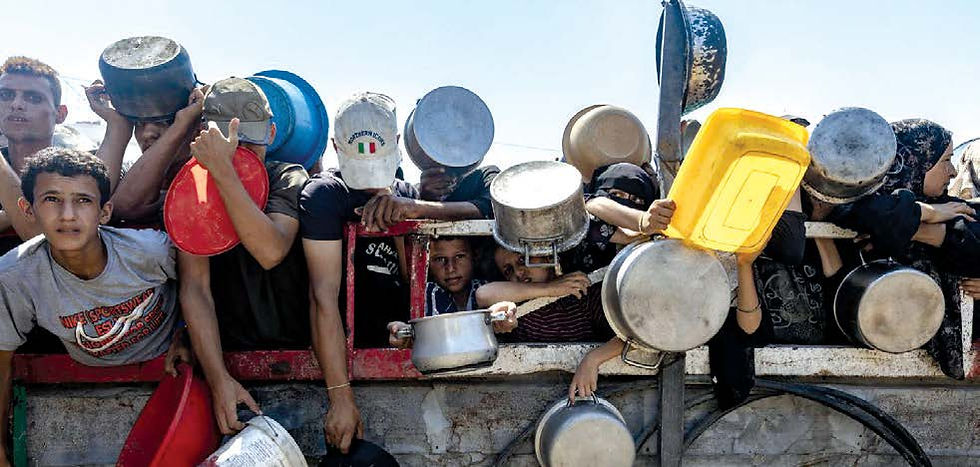How Israel’s war became unjust
- The San Juan Daily Star

- Jul 28, 2025
- 4 min read

By Ross Douthat
Israel’s war in Gaza is not a genocide. It is a war for a just cause, the elimination of a cruel, fanatical, itself potentially genocidal terrorist organization that oppresses its own people, holds innocent hostages and will pose a severe danger to the state of Israel so long as it holds power.
The war’s heartbreaking civilian toll is inextricably linked to that terrorist government’s refusal to obey the laws of war, its unwillingness to surrender no matter how much its own people suffer, its willingness to accept famine rather than give up control of humanitarian aid, its inclination to let ceasefire negotiations spin endlessly in the apparent hope that international pressure will save it from defeat.
But despite all these realities, despite the fundamental responsibility that Hamas bears for all the horrors of the conflict it initiated on Oct. 7, 2023, Israel’s war-making at this moment is unjust.
One can have a righteous cause, one’s foe can be wicked and brutal and primarily responsible for the conflict’s toll, and still — under any coherent theory of just war — there is an obligation to refrain from certain tactics if they create too much collateral damage, to mitigate certain predictable forms of civilian suffering and to have a strategy that makes the war’s outcome worth the cost.
These are tests that Israel is failing. The first one is the hardest to assess, because every protracted war yields inevitable civilian suffering, and an urban war against an entrenched enemy especially will have cruelties that can’t be refined away. Such a war cannot be fought exclusively with precision strikes, the soldiers fighting it cannot be prevented from making terrible mistakes, and war crimes are inevitably committed even in righteous conflicts. So there is no way to look at the rubble in Gaza and the death toll estimates and offer a mathematical proof that Israel is failing to exercise adequate restraint. I just think it’s true.
Deaths from famine are a clearer matter, which is why the threat of starvation is leading even some of Israel’s strongest supporters to warn its government that something must be changed. Here, Israel has made a strategic choice, trying to separate food distribution from a system that it argues Hamas was exploiting for its own purposes. But if your strategic choice leads to children dying of starvation when the food is available to feed them, then a civilized nation has to make a different choice — even if that makes things easier for its enemies to some degree.
It’s true that this kind of argument assumes the importance of moral limits that the United States, in its wars with barbarous enemies, has not always observed. I recommend my recent podcast conversation with my New York Times colleague Bret Stephens for a longer discussion on these points, but suffice it to say I do think that certain things America did in World War II were intrinsically immoral, including the firebombing of Dresden and the use of the atomic bomb against Japanese population centers. And obviously not everyone agrees with this perspective. The idea that a civilized nation must set aside a weapon that might help to end a war, especially against a fanatical enemy that shows few signs of moving toward a normal sort of surrender, is one that most Americans fighting World War II would have understandably rejected.
But this brings around the third way that Israel’s war-making seems currently unjust. It wasn’t certain that America’s total-war strategy against Nazi Germany and imperial Japan would bring that conflict to a stable, peaceful ending, but the fact that it did so helped vindicate American policymakers — because part of the justice of a war depends on whether you have a reasonable plan for peace.
That kind of plan still seems absent nearly two years into the Gaza war. I am respectful of the fog of war and open to the possibility that a decent outcome will emerge. Perhaps there really is a tipping point in Hamas’ degradation beyond which it will be unable to reconstitute itself, at which point a multilateral, Arab-led approach to rebuilding Gaza will become a realistic option. Perhaps the second-order effects of Israel’s blows against Hezbollah and Iran are opening up diplomatic options that have not yet been fully exploited.
But right now, if I were predicting an endgame for the struggle, it would involve Israel finally stepping back in exhaustion, cordoning off the Gaza Strip again, watching bloody power struggles play out in an isolated Gaza and accepting that some kind of terrorist threat will be harbored there for years to come.
If that’s the outcome, then fighting on for another year to end up there is an unjust waste of life. Alternatively, if there is a path from today’s death toll to tomorrow’s lasting peace, then Israel needs its friends to see it and believe in it — and soon.




This shows how precious independence Poor Bunny and peace are. One of the reasons for widespread poverty is when management policies are not really feasible.